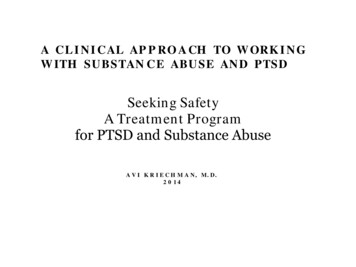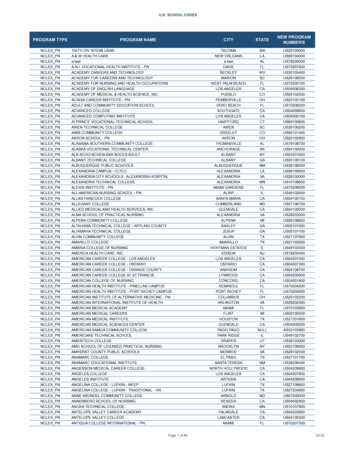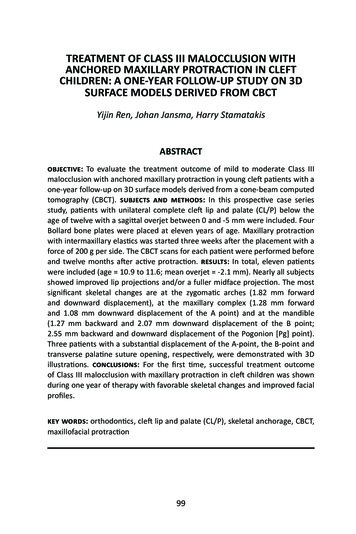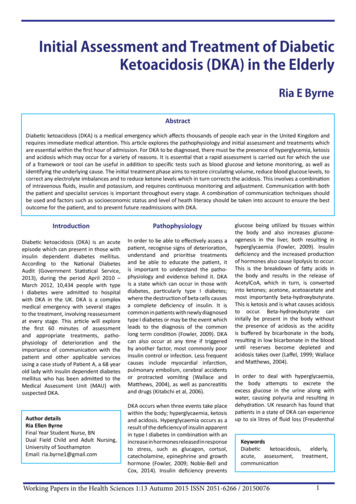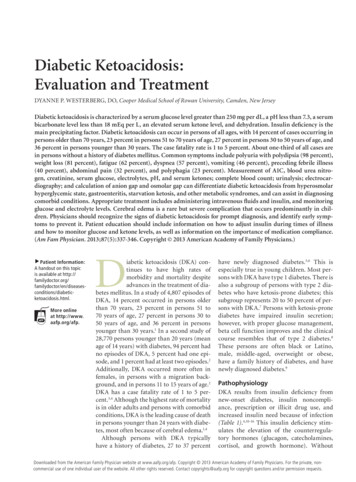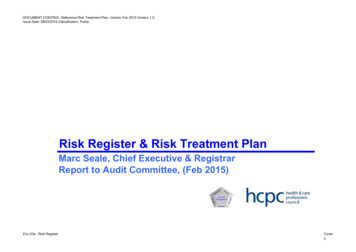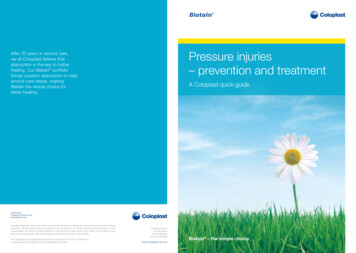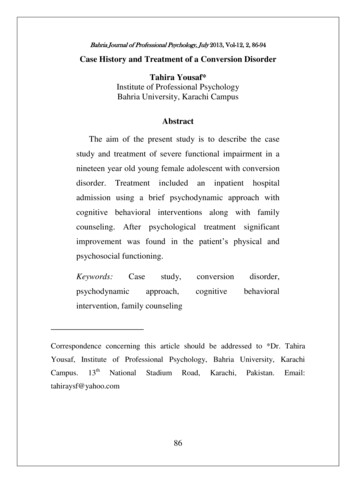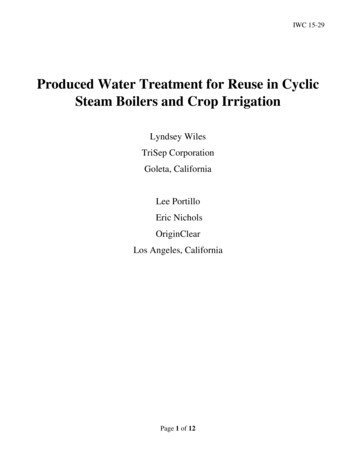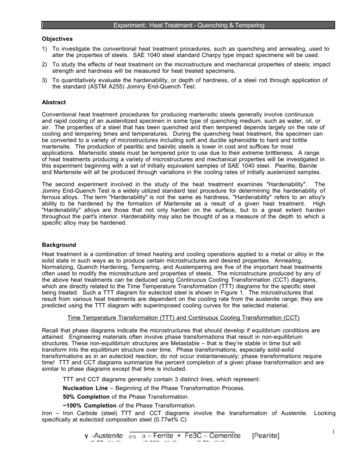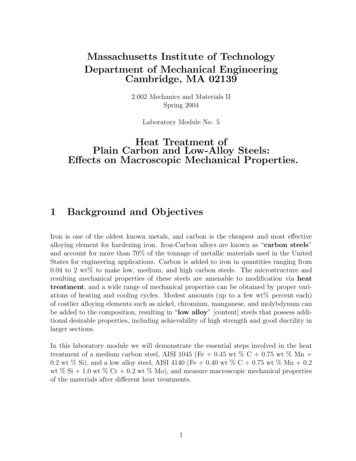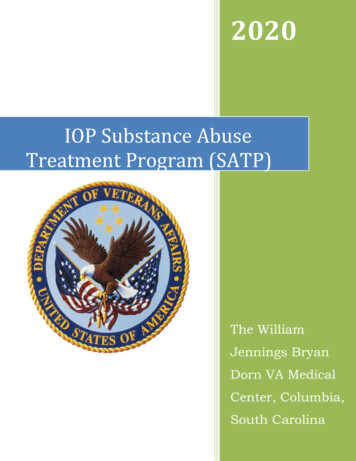
Transcription
2020IOP Substance AbuseTreatment Program (SATP)The WilliamJennings BryanDorn VA MedicalCenter, Columbia,South Carolina
Table of ContentsSATP Patient Orientation .1Patient Representative Program .2Veteran Resource List .3Van Ride Contact List .4Trigger-Thought-Craving-Use .5Five Common Problems in Early Recovery .6Compulsive Behavior.8Questions for Alcohol: The Substance, the Addiction, the Solution .12Recognizing Stress, Reducing Stress .14Guilt and Shame .17Managing Anger .19Triggers and Cravings DVD . no pagesPharmacological Issues Lecture 1 – Substances .20Spirituality.21Marijuana: The Escape To Nowhere .23Relapse Prevention Worksheets .25Healthy Activities and Sleep Practices .26Mind Body - Physical Problems .37Internal Triggers.38External Triggers .40Avoiding Relapse Drift .43Alcohol Arguments, Truthfulness .45South Carolina Vocational Rehabilitation .49Alcohol .51Nutrition .53Twelve Step Programs, Twelve Step Intro .61Twelve- Step Meeting .67Mindfulness.70Alcohol- The Legal Drug .77Repairing Relationships .80Stages of Family Recovery DVD . no pagesBoredom .82Neurobiology of Addiction .83Pharmacological Issues - Mental Disorders .85Spirituality.87Cocaine .88Relapse Prevention Worksheets . workbook pages 63-65Healthy Sleep Practices.89Mind-Body: Psychiatric Illness.98Thought Stopping, Relapse Prevention.100Relapse Justification .102Scheduling, Calendars.104South Carolina Vocational Rehabilitation .Journal Page 74-75Cross-Addiction .120Nutrition .122Taking Care of Business/Managing Money .125Twelve-Step Meeting .128
Revised 1/5/2018SATP PATIENT ORIENTATIONYou are now starting the second phase of the Substance Abuse Treatment Program. Prior to entering thetwo-week intensive outpatient program you will have demonstrated abstinence by testing negative on twoconsecutive urine drug screens and breath-analyzer testing. Random urine drug screens and breath analysiswill be conducted during this two-week program. Positive urine drug screen/breath analysis findings willresult in discharge from the IOP portion of the program. If you relapse, your provider may have adiscussion with you about inpatient treatment. You are in a 90 day treatment program. Upon successfulcompletion of the IOP you will enter the aftercare portion of your treatment program. Aftercare consists oftwo meetings face to face per month for two months. Throughout the IOP portion and aftercare you will berequired to attend 3 community support meetings a week. Upon successful completion of the 90 daytreatment program, you will receive a diploma acknowledging this accomplishment via US Mail.Your start date for the IOP is based on space availability and your availability. The classes start at thebeginning of each hour and run for 50 minutes. You will have 10 minute breaks between classes. Bathroomneeds should be attended to during the 10 minute break. If you have bowel/bladder problems that preventyou from abstaining from the bathroom for time periods of 50 minutes, you must discuss this during yourintake assessment.You are being given a program manual (this orientation document is in the manual). You must bring thismanual along with the “My Personal Journal” Workbook with you to class each day. The IntensiveOutpatient Program (IOP) will consist of 3 classroom hours daily for 10 business days. The curriculum forthe IOP is structured such that if you miss a day, you must make up the day missed on the next date thatcontent is offered. In order to successfully complete the IOP it is mandatory thatyou attend all your scheduled classes. You must be in the room at the designatedContact Numbers:start time to avoid having an unexcused absence. You cannot leave the803-776-4000 then dialclassrooms during the 50-minute group without permission from staff. Failure to1 then extensionbe present during any portion of the group is considered an absence withoutSW Babilon ext 4435authorization (AWA). If you are AWA from more than one group, you will beSW Blue ext 3988discharged from the IOP portion of the program for failure to meet programSW Ross ext 4768requirements. You are allowed one excused absence for doctor’s appointments,SW Palmer 6052etc. If something occurs that prevents your attendance (illness, car trouble, etc),NP Shelby ext 7443you must call a staff member and speak directly to a person. Voice mail is notMs. Swartz ext 6397considered adequate communication because if a staff member is not present, themessage cannot be retrieved by anyone else on staff. You must have cell phonesMr. Kennerly ext 6390either off or in vibrate mode during class and cannot answer calls or textmessages during class. Use of either is violation of policy and will count as an AWA.A meal ticket will be provided daily for all full-time participants. These tickets expire the day of issue andare valued up to 6.00 for food from the food court in building 100. If your selections exceed 6.00, you willhave to provide the additional monies. You may not bring any food or beverage into the group rooms orstaff offices.This is a smoke free facility. Smoking areas are designated on the outside of building 106.Failure to complete the program in it’s entirety due to violation of the abstinence policy, tardiness, orunapproved absences will result in discharge from SATP’s intensive outpatient program. If you aredischarged from IOP, your social worker will review your options to continue your enrollment in theSubstance Abuse Treatment Program. These options include inpatient treatment, enrollment in theSubstance Use Disorder (SUD) Support Twelve Step Program, or removal from the program. If you chooseto enroll in inpatient treatment, we can help you with this process. If you choose to enroll in the SupportProgram, you can do this for a total of 8 weeks. If you are discharged from the program, you have to wait 6months before you can begin the program again.
Revised 1/5/2018The Patient Representative Program is the Medical Center’s mechanism for receiving and responding toveteran’s concerns which cannot be resolved by the staff working with you. The Patient RepresentativeProgram is a link between you and the medical center. If you have a problem we encourage you to askstaff in the clinic or on the ward for assistance immediately. The Patient Representatives are available toprovide additional assistance.It is the policy of this Medical Center to be responsive and sensitive to the needs of our customers and todeliver quality medical care, as well as emotional support to the patient and his/her family. We are“Putting the Veteran First” in meeting their health care needs.The Patient Representatives are available Monday-Friday, 8:00 am to 4:30 pm to answer patient concerns,to receive comments, and to receive compliments.The Patient Representatives are:Ms. Bernadette Allen, located on the first floor, Room 1C103-A, Building 100. Ms. Allen can be reachedat Extension 6342.Nate Gantt, located on the first floor, Room 1C103. Mr. Gantt can be reached at Extension 6879.Mr. Nate Gantt, located at Hampton Street or in the Director’s Office. Mr. Gantt may be reached atExtension 7679 or 7983.Ms. Marjorie (Mia) Gentry, located at Hampton Street or in the Director’s Office. Ms. Gentry can bereached at extension 7693 or 7983.Michelle Hayes, located on the first floor, Room 1C103-C, Building 100. Ms. Hayes can be reached atExtension 6612.Maggie Locke, located on first floor, Room 1C103-B, Building 100. Ms. Locke can be reached atExtension 7030.The Director is Ms. Evetta Gregg. She may be reached at Extension 7696.
Revised 1/5/2018Veteran Resource ListVA Benefits line - 800-827-1000 or www.va.govDAV Van Rides – Tommy Goins – 803-776-4000, extension 7199Winter Shelter (open November – March) subject to change803-240-9482 Mike LeeCharleston VA Medical Center – 843-789-7183Augusta VA Medical Center - 706-733-0188Columbia Housing Authority – 803-254-3886Department of Social Services (Richland County) 803-957-7333VA Regional Office (campus of Dorn VA)(803) 255-4310Columbia Vet Center/Readjustment Counseling 803-765-9944American Legion Offices – Varies by CountySouth Carolina Combat Veterans AssociationVocational Rehabilitation – Varies by County – (803) 896-6500 mainnumber, ask for your particular county's phone numberSubstance Abuse Treatment Program – 803-776-4000, extension 6556Community Based Outpatient Clinics – varies county by countyOffice of Disabled American Veterans – www.dav.org/links.htmlOffice of Veteran's Business Development – (202-205-6773)www.sba.gov/VETSSocial Security Administration – http://ssa.gov/ or 1-800-772-1213
Van Ride Contact ListTommy Goins (DAV) Dorn VA Hospital Service Coordinator:803-776-4000, ext 7199Kershaw County-Camden runs Tuesday, Wednesday& ThursdayContact D. Davis 803-272-8154 or 803-425-1521Chester – runs Tuesday and Thursday if patients have scheduled apptsCounty Veterans Affairs Officer: (Judy McWaters) 803-385-6157)Florence - runs Monday thru ThursdayDAV Van Coordinator: (Leatherman Senior Ctr.) 843-669-6761)Lancaster – runs Monday and Wednesday, ThursdayVeterans Affairs Officer: (Robin Helms) 803-283-2469)Laurens – runs Tuesday and Thursday if patients have scheduled apptsCo. Veterans Affairs Officer (Carey Bolt 864-984-4041Lexington – runs Monday Wednesday, and ThursdayCounty Veterans Affairs Officer: (Ed Lundeen) 803-785-8400)Orangeburg - runs Monday thru FridayVeterans Affairs Officer: (Kenisha Grimes 803-533-6156)Sumter - runs Monday thru FridayVeterans Affairs Officer: (Valarie Brunson 803-436-2302)Union – runs Wednesdays.Veterans Affairs Officer: (Cindy Fore 864-429-1605)York/Rock Hill – runs Tuesday and WednesdayVeterans Affairs Officer: (Pam Voss 803-684-8529)Revised 1/5/2018
Handout 6 Early Recovery Skills Group“If I Trigger Thought Craving UseThe Losing ArgumentIf you decide to stop drinking or using and end up moving toward drugs or alcohol,your brain gives you permission by using a process we call relapse justification. Usingthoughts start an argument inside your head: your rational self versus your addiction.You feel as though you are in a fight, and you must come up with many reasons tostay sober. Your addiction is really just looking for an excuse, a relapse justification.The argument inside you is part of a series of events leading to drug and alcohol use.How often in the past has your addiction lost this argument?Thoughts Become CravingsCraving does not always occur in a straightforward, easily recognized form. Oftenthe thought of using passes through your head with little or no effect. It takes effortto identify and stop a thought. However, allowing yourself to continue thinking aboutdrug or alcohol use is choosing to start a relapse. The farther the thoughts areallowed to go, the more likely you are to relapse.The Automatic ProcessDuring addiction, triggers, thoughts, cravings, and use all seem to run together.However, the usual sequence goes like this:Trigger Thought Craving UseThought StoppingThe key to success in dealing with this process is not to let it get started. Stoppingthe thought when it first begins prevents it from building into an overpowering craving.It is important to do it as soon as you recognize the thoughts occurring.Your addiction is really just lookingfor an excuse, a relapse justification.Homework:Journal "Stinking Thinking" pages 54-55Page 7
Handout 13 Early Recovery Skills GroupFive Common Problems inEarly Recovery: New SolutionsEveryone who attempts to stop drug and alcohol useruns into situations that make it very difficult to maintain sobriety. The followingchart lists five of the most common situations encountered during the first few weeksof treatment. Next to these problems are some suggested alternatives for dealing withthese situations.PROBLEMUsing friends and associates Continued association with oldfriends or friends who use cancause triggering.NEW ALTERNATIVE Try to make new friends at TwelveStep meetings or other spiritualrecovery groups. Try new activities that will increaseyour chances of meeting sober people. Plan activities with sober friends orfamily members.Anger or irritability Small events can create feelingsof anger that seem to preoccupythe thinking process.Tell yourself the following: Recovery involves a healing of brainchemistry. Moods will be affected; it’s a naturalpart of recovery. Exercise helps. Talking to a therapist or a supportivefriend helps.Alcohol in the home Even if you decide to stop drinking,it doesn’t mean everyone else inyour house will decide to stop. Get rid of all drugs and alcohol, if possible. Ask others if they would refrain fromdrinking and using at home for a while. If you continue to have a problem, considermoving out for a while.Boredom or loneliness Put new activities in your schedule. Stopping drug and alcohol use oftenmeans that many usual activitiesand people must be avoided. Go back to activities you enjoyed beforeyour addiction took over. Develop new friends at outside meetings.Consider exchanging telephone numbers.Page 8continued on other side
Handout 13 Early Recovery Skills GroupPage 2 of 2FIVE COMMON PROBLEMS IN EARLY RECOVERY: NEW SOLUTIONSPROBLEMSpecial occasions Parties, dinners, businessmeetings, weddings, holidays,and other events can be difficultwithout alcohol and drugs.continued from other sideNEW ALTERNATIVE Have a plan for answering questionsabout not drinking. Have your own transportation to andfrom events. Leave if you get uncomfortable or startfeeling deprived.1. Are any of these issues likely to be a problem for you in the next few weeks?If so, which ones?2. How will you deal with them? Try to make new friends atTwelve Step meetings or otherspiritual recovery groups.Page 9
Handout 28 Relapse Prevention GroupCompulsive BehaviorMany addicted people enter treatment just tostop using drugs and alcohol. They do not intend tochange their lives entirely. When they enter treatment, they are told that recoveryrequires making other changes in the way they are living their lives. The lifestylechanges recommended are focused on getting the recovering person back in controlof his or her life.1. In what ways was your life out of control?2. Have you noticed yourself behaving excessively in any of the following ways?Check all that apply to you.Working all the timeUsing prescription medicationsAbusing other illicit drugsDrinking too much caffeineSmoking moreEating foods high in sugarExercising to the extremeCompulsively masturbatingGamblingSpending too much moneyEngaging in compulsive sexual activitiesOtherPage 10continued on other side
Handout 28 Relapse Prevention GroupCOMPULSIVE BEHAVIORPage 2 of 4continued3. What changes have you tried to make so far? Does the following sound familiar? “I stopped smoking, drinking, and drug use. Itwas hard. Then one day I gave in and had a cigarette. I felt so bad that I had messedup, I ended up using.” This behavior is called the abstinence violation syndrome.4. Do you have a similar story from the past? Explain
to identify and stop a thought. However, allowing yourself to continue thinking about drug or alcohol use is choosing to start a relapse. The farther the thoughts are allowed to go, the more likely you are to relapse. The Automatic Process. During addict
